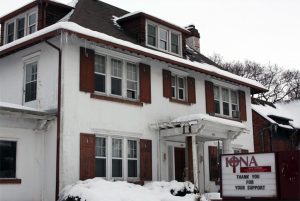Iona College

The front of Iona College at 208 Sunset Ave. (Photo by Miranda Monahan.)
By Miranda Monahan
Windsor city councilors have decided not to designate Iona College as a historic building.
Iona College has quite a rich history and it belonged to one of Windsor’s prominently known 20th-century figures which some people may not know about.
The college was built in 1924 and was originally a house. The house was owned by Judge Bruce J.S. Macdonald from 1951 to 1969. He also lived in three other homes in the city
Macdonald moved to Windsor in 1927 after graduating with a law degree from the University of Alberta. He joined the law firm of Norman A. McLarty and Gordon L. Fraser. In September of 1930, he became the city’s first solicitor and helped amalgamate Sandwich, East Windsor and Walkerville into Windsor and was active in the development to refund the debts of the amalgamated towns. During WWII, Macdonald served as a lieutenant-colonel and commanding officer of the Essex Scottish Regiment during the invasion of Normandy, France. He was appointed to King’s Council in 1944.
After WWII, Macdonald served as Canada’s chief war crimes prosecutor at the Nuremberg Trials. He returned to Windsor in 1946 and joined the law firm of Robert Wilson, Gordon Thomson and Bruce J. S. Macdonald, which was newly created at the time.
Macdonald became the Crown Attorney for Essex County in April of 1951 and took on the large task of fixing the city’s corrupt police force and restore order to the police force. Macdonald remained a Crown Attorney until he became the judge of county and district courts in Ontario in October of 1961. Macdonald remained in Windsor during his time in this position.
Macdonald retired in December of 1977. Macdonald presided as a small claims court judge until he died in 1986. The street Macdonald lived on became known as Judge’s Row.
On Oct. 29, 2016, woodwork, doors and other items-even pieces which were still nailed down-were sold.
The University of Windsor purchased the college. The college was home to two different schools – The School of Languages which provided English as a section language instruction and The School of Theology which offered a bachelor of Theology degree in conjunction with Huntington University in Sudbury, Ont. and Ecumenical Theological Seminary in Detroit, Mich.
Having been turned down for historical designation by the Windsor city council, the University of Windsor plans to demolish the college and turn its land into green space.
Ward 9 councilor Hilary Payne says repairing Iona College would be too costly.
“There was no way the university could afford to repair the college. The repairs would have cost about two and a quarter million dollars,” said Payne.
Kristina Tang, acting heritage planner for the city of Windsor, said not every historical building has to qualify to be given historical designation.
“Not every eligible property is given heritage designation. It was a decision of Council not to designate the property,” said Tang.
If the college had been given historical designation, the university would not be legally allowed to demolish it.
“In Windsor, an owner can request through administration if they are interested in designation for the process to be started. The only heritage restrictions for Register Listed properties is demolition,” said Tang.
Tang said historic designation of buildings is always a decision of city council.
“Extensive research is conducted on the property then evaluated against Ontario Regulation Criteria for Designation before it is decided by city council to change the heritage status of a property,” said Tang. “Designation would apply heritage restrictions against specific features of a property, for example, bricks, parapet, etc., however, there will also be opportunity for financial assistance in repairing and/or restoring those features.”
The university has filed for a demolition permit and estimates the costs of repairing the college and bringing it up to university grade at $3 million.
It is unknown if and when the college will be demolished.


